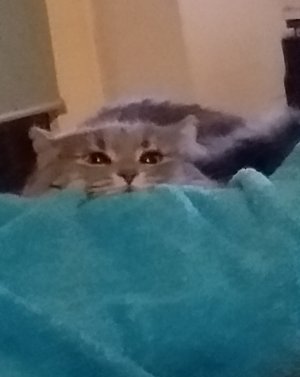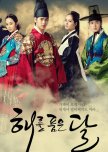I have shied well away from Korean historical dramas since I started watching Asian shows. I did try out a few in the past and by the end of a couple of episodes at best I was bored to death, mighty frustrated, totally confused or an unpleasant combination of the three.
Why I decided to watch The Moon/Sun is a long story which I'm kindly going to spare you. Suffice to know, 20 minutes in and I was hooked. This review is therefore dedicated to viewers who, like me, have never been fond of the genre.
Captivated by the details of folklore scattered throughout this drama, I decided to read up on their historical dependability. I so found out that the Saeguks of the past were all based upon true facts derived from Joseon annals, while the newer productions often deviate from this norm, by either introducing a few fictional facts on a documented background (fusion Saeguks) or creating a fantasy world in terms of characters, plot, even costumes. The Moon embracing the Sun falls into the latter category, so if what you look for is a lesson on how royalty lived in the Joseon era, you'd better forget this drama. This isn't a perfect Saeguk by far, possibly not a perfect drama either. It is, however, a perfect fairytale and in this light I believe it fully deserves the high marks many of us awarded it and the success it attained in Korea.
.
The fairytale elements are all there from the very beginning. Prepare yourself for a journey into magic, undying love, friendship, betrayal, hate, tears, laughter, curses and so on and so forth. A childlike approach to the viewing is needed, lest you want to spend your time wondering at its credibility or lack thereof. And because a work of fiction should never be judged outside its narrative context, it is undeniable this story works, and works well. Now that I have completed it, I fully understand the complains of those who wished for a different epilogue for some of the characters, but personally I was prepared to face losses and would go as far as to say they were a necessity induced by the premises of this story.
I won't spend too many words on the acting. Everybody has sang praises for the teenagers' cast, which I second. Nevertheless, the adult cast was outstanding, Han Ga In included – it was truly hard to surpass the grace, beauty and artless charm of the 13 year old Yeom Woo. Han Ga In didn't steal my heart at first but sneaked into it with steadfast progression. She has one of the most pleasant voices I know. I was literally mesmerized by Kim Soo Hyun, but I won't lie: I have a hard time separating my hormonal reaction to my logical thinking, when it comes to him. Whatever the case, he gave life to a multilayered, unforgettable character.
I'd love to talk in detail about each and every endearing character – see on top the Eunuch and Wun – but I fear this is becoming long enough.
I thought the transition from children to adults was marvellously made, and not surprisingly my very favourite scene is the 8 years jump, both on a visual as well as an emotional and symbolic level.
There have been times when I wished they had made use of more open-space sets, but not only I have not enough experience in period dramas to know whether this is often the case, but following what I wrote before, the enclosed setting works well in creating a sort of fantasy bubble out of time and reality.
Little visual details made my day, and I have no qualms in declaring this drama displays the most beautiful letter ever shown on screen.
A huge part of this drama emotional impact is played by the music. Mainly instrumental and with lovely insertions of traditional instruments such as zithers, harps and lutes, it would be perfectly fit for a grand period movie. Notable mention for the minor key pieces, especially 'Like Petals, Like Flames', 'The Sorrow Song of Love' and the enchanting 'Butterfly Dance'. They all play on the viewer's emotion and are wonderfully suggestive of the scene they soundtrack.
As for re-watch value… I am toying with the idea of starting afresh next week. I suppose this says it all.
Esta resenha foi útil para você?


 2
2




















